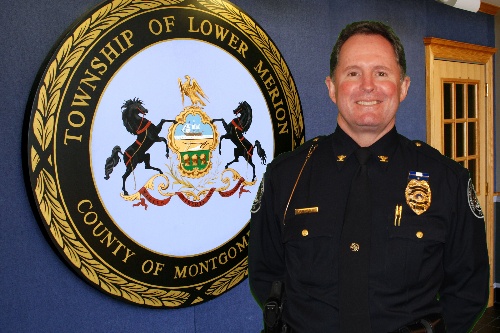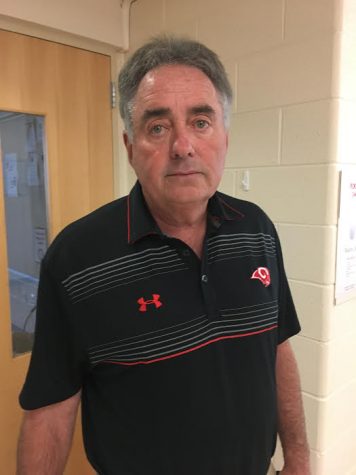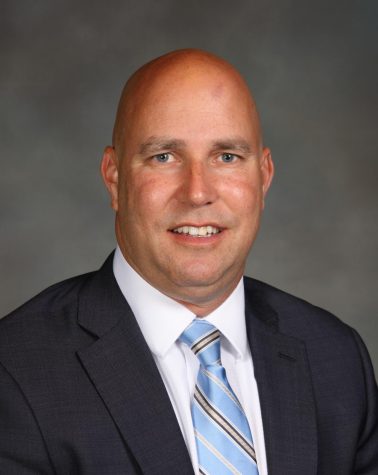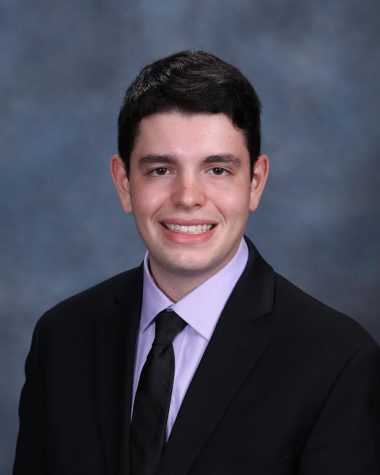Safety in our Schools: An In-Depth Look

Lower Merion Police Superintendent Michael J. McGrath.
The communities of Newtown and Parkland are not unlike our own.
On February 14, our nation was hit once again by tragedy after Nikolas Cruz was successfully able to gain access into Stoneman Douglas High School on his way to killing 17 innocent students and faculty members. This tragedy raised questions all over the nation about safety in our schools and forced many to question their administrators to find out what precautions are in place to keep their schools safe.
Over the past few weeks, in discussions with top officials–Harriton principal, Mr. Weinstein; head of campus aides, Mr. Lista; and Lower Merion Police Superintendent, Michael McGrath–regarding school safety, these officials provided information regarding precautions being taken in the Harriton and Lower Merion community in order to reduce the chances of such an attack as the one in Parkland from occurring in our own community.

How do we know that the Harriton building is safe each time that we walk in? Mr. Lista began by assuring me that he makes every effort to make the school as safe as possible by monitoring all entrances to the school each morning and surveying students as they walk into the building.
He went on to say that the most important thing is “getting information from the students about what’s going on in the student body.” The three athletics coaches on his team, he said, are extremely valuable due to their relationships with students.
Mr. Lista added, “In addition to the three coaches, there are two retired police officers and a current military campus aide, who have handled almost any type of situation that we could ever encounter at Harriton. I couldn’t pick a better group, and I have full confidence in any one of us.”
Mr Weinstein feels safe every time he walks into Harriton.
“At no time have I walked into one of the four buildings that I’ve worked at in the district and felt worried or unsafe,” Mr. Weinstein said. He also stressed the school district’s being proactive and creating emergency operations plans in order to ensure the safety of its students and staff.
In our township, Superintendent McGrath stated that homicide is rare in Lower Merion, that it has been well over a decade since the last homicide in the township.
The only school-related incident in Superintendent McGrath’s memory was in the summer of 1994, when there was a homicide in a former part of the Ardmore Junior High School building, on the sight of what is now the Lower Merion High School parking lot, where a teacher was confronted by a women wielding a firearm and was killed. An alleged affair with someone the assailant knew was the reason for this act.
The United States Court of Appeals record describe the shooting, and also points out the absence of security measures that are in place today.
“On July 28, 1994, Diane Morse, a teacher at the Ardmore Child Care Center, was shot and killed in front of a classroom of children by Arcelia Truman (“Trudy”) Stovall, a local resident with a history of mental illness. The Ardmore Child Care Center, which is owned and operated by the Daycare Association of Montgomery County, has operated out of a wing of Lower Merion High School for several years, under a lease between the Daycare Association and the Lower Merion School District. Stovall, who was subsequently convicted of the murder of Diane Morse and incarcerated in a psychiatric hospital, was able to enter the building through an unlocked rear entrance,” court documents say.
Supt. McGrath, a sergeant at the time, responded to the shooting. He uses this experience as a reminder that neighborhoods such as Lower Merion are not immune to this sort of violence and every precaution that can be made should be made.
Regarding precautions being taken by the school district in order to prevent an attack, Supt. McGrath discussed the school district’s School Safety Task Force, upon which he serves. The job of the task force is to audit safety procedures throughout the school district and recommend modifications where they feel necessary.
Mr. Weinstein also discussed this task force and specifically its work in creating emergency operations plans that are shared with staff in meetings and in binders that are placed in each classroom. Mr. Weinstein pointed out that an example of a safety modification that the task force could consider would be to monitor social media as a part of its commitment to being proactive in responding to threats.
As a part of being proactive, Mr. Weinstein and Supt. McGrath also pointed out that designs of the two high schools were carefully created with safety in mind. Both schools require guests to enter the office as their first and only point of entry where they must be given permission in order to enter the school.
Although this is an important architectural aspect of safety, Mr. Lista said, “It is up to the students to keep themselves safe by making sure they don’t hold doors open for anyone.”
Supt. McGrath agrees with Mr. Lista, saying, “The real key to anything, is everybody who goes to the facility has to be on the same page; you can put locks on doors, you can do all kinds of controls but if people leave doors open, you’re kind of defeating the purpose.”
Another key in keeping our schools safe is strong communication between law enforcement and the school district. Mr. Lista assured me that administrators are in constant contact with Lower Merion Police Department.
Mr. Weinstein cited a meeting district administration had with the Lower Merion Police Department last year where they discussed building police community in schools by having officers “show up not only when someone breaks the law but also when things are safe so they can show their faces and get to know the school community and the building.”
Such police outreach in schools is meant to build rapport between the students and staff and the officers so that should an incident occur, the officers will know that students and building staff will put their trust in the officers responding to a situation.
Mr. Lista and Supt. McGrath both emphasized that it is important that students have trust in the campus aides and police officers to do their job and keep the building safe.
Supt. McGrath pointed out that the police department perform frequent active shooter exercises in local schools, including Harriton, where they will simulate a response to an active shooter situation. This allows officers to practice while familiarizing themselves with the building.
Supt. McGrath also discussed the breakdown in communications between the FBI, local law enforcement and district officials in Parkland when tips about shooter Nikolas Cruz came to their attention.
“If we get any information about threats against the school district or any schools, we are going to contact the district administrators as soon as we have it, and work with them to formulate a response,” Superintendent McGrath said.

At the school level, Mr. Weinstein said, “We frequently get messages from students about a concern that’s happened in school. I get them personally, our counselors get them, our administrators get them and teachers get them, I think we have a good culture built around, arguably the most important precaution we can take: sharing safety concerns with adults. I feel we have a culture built around doing that really well.”
The overall message is that while the officials are doing everything in their power to keep our schools safe, students are a very important partner in ensuring the safety of the school community.
“Be aware of your surroundings,” Mr. Lista said. “You’ll know if a kid’s having problems. If they’re not right and it’s up to you to let us know, I’ll take it to the right people.”
“Everybody has a part in this,” Superintendent McGrath said. “Teachers, administrators, and students can keep your area safe by working together. If a student’s having a problem, you’re the ones that know about it before anyone else. You have to help them out, maybe you reach out to a counselor, but overall, everybody cares, everybody’s working together to make it as safe as possible.”
“We rely on students to share those things. It’s really important to keep our building safe.” Mr. Weinstein said. “Another important thing we must do is continue our culture of kindness and treating everybody with respect. It is crucial to maintain a safe environment in school. Being kind, being inclusive and informing an adult when something doesn’t feel or seem right to you. This is something for which we rely on students a great deal and we ask them to keep doing that.”
Trust, then, is what will keep us safe. Trust in adults by knowing that they are doing all that’s in their power to ensure our safety by putting in place proactive measures to prevent threats to our community. And students should trust in each other to share feelings and seek out help for a peer who doesn’t seem right.
If we put our trust in one another, I believe Harriton will continue to be the community of kindness and safety that we know it to be.

Adam Grimes '19 is excited to be entering his second year writing for the Banner. He writes primarily for the News and Opinion sections. Outside of school,...

